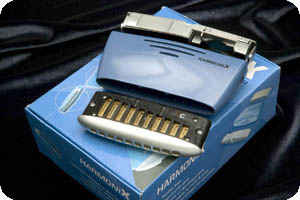Harmonix Modular Harmonica System
We've had quite a few new harmonicas hit the market over the last few years, but most of them have been variations on familiar themes, rather than radical new designs. I think it is quite safe to say that the Harmonix is unlike most diatonic harmonicas currently available. Some of you may already be familiar with the Harmonic Solutions products, designed by Richard Smith.
These were standard harmonicas with patented microphone units implanted in the body of the instrument. For a while, Hering produced both a chromatic and a diatonic using the Harmonic Solutions system and Richard made some custom items for people like Stevie Wonder. However, the Harmonix System takes things several steps further.
Harmonix Modular Harmonica System Review

The Harmonix is a modular diatonic harmonica, comprising of three main parts - the cartridge, the housing and a module that contains the electronics. The housing is a wedge shaped blue plastic cover that is contoured to fit the player's hand. The cartridge contains the reeds and has an integral curved silver plastic mouthpiece. It slides into the front of the housing and locks into place without the needs for screws or bolts and can be easily removed to exchange it for a cartridge in another key or tuning. The module slides into the rear of the housing, again requiring no tools to remove or replace it.
The basic starter instrument comes with a dummy module, but this can be upgraded to one of the units with the built-in microphones, either the EX1 recording module (which is connected via a cable to a belt pack, which is in turn connected to an amplifier, effects processor, or other device), or the WX1 stage module (which allows for wireless transmission to a base unit, which is in turn connected to your amplifier). The whole thing is visually striking, looking more like something that Captain Kirk might play, rather than Little Walter.
Richard kindly allowed me to try out the system with the WX1 wireless unit. I must admit that I was initially skeptical. After all, surely it would be easier just to buy a standard wireless microphone system and use your favourite harmonica with it? Well, perhaps it would, but after just a couple of minutes of walking all around the house playing the thing and having the sound coming from my trust Pignose amp in the music room, I was sold on the concept. I don't get asked to play Wembley Arena very often (to be honest, I don't get asked at all!), but I can understand why Mick Jagger is a satisfied user of the Harmonic Solutions products.
The feeling of liberation was quite heady indeed - no wires, no microphone, just me and a harmonica broadcasting to my amplifier. The wireless system worked extremely well and delivered a very faithful reproduction of the harmonica sound, with quite a resistance to feedback. The microphone units are made by AKG, a European company respected for their audio products, so I feel confident in their quality and durability.
The harmonica itself is comfortable to play. I did wonder if the plastic housing might tend to slip out of sweaty hands, but so far that hasn't happened. The mouthpiece design is rather unique. Although the hole spacing is the same as on most other diatonics, the mouthpiece has a convex curve to it, the opposite of the concave curve used on some octave harmonicas. It may feel a little unfamiliar at first to some players, but personally, I found it easy to adapt to it and actually, I think I could come to prefer it over the usual shape.
The housing seems to funnel the sound much in the same way as the Hohner CX12, making it easier to produce hand vibrato and wahwah sounds, all of which are faithfully reproduced via the microphone implants. Future plans for the Harmonix system include purpose designed reeds, but the current production models use typical Chinese made reedplates, similar to those found in Huang diatonics, the Suzuki Folkmaster and similar models. The combination of these reeds plus certain design characteristics of the Harmonix itself does give the instrument a somewhat different response to other diatonics.
At first, I found it was tough to control certain techniques, but things improved after spending some time playing it. However, even after careful adjustment of the reeds, I am still unable to produce reliable overblows on it. This probably isn't a showstopper for the average player and may well be offset by the other advantages the Harmonix offers.
The basic starter pack is the HX1. It consists of the housing, a cartridge in the key of C, a dummy module and a CD-ROM guide. It retails at £25, allowing you to try out the harmonica without spending the extra money on the electronic parts. Cartridges are available in all 12 major keys and a selection of the common minor keys at £11 each. The EX1 recording module comes with a belt pack and cable and costs £140.
The WX1 wireless module comes with a receiver and power supply and is priced at £250. If the idea of built-in microphones and wireless operation appeals to you, but you don't want to give up your favourite harmonica, or if your favorite harmonica happens to be a chromatic, Richard can customise your own harmonica with the microphone units. He also sells clip-on external units for chromatics and small handheld microphones, so you don't have to have holes drilled into your favourite instrument!
Update
I have been informed that the Harmonix MKII is currently in development, which hopefully addresses some of the criticisms I had of the original intrument. In the meantime, here are the updated contact details for Harmonix and haRmonic Solutions:
Harmonix Harmonicas
Harmonix harmonicas are distributed worldwide. For information about local stockists go to the "International distributors" page and click on the relevant distributor who will be able to help you.
Headquarters: King St, Colyton, Devon, EX24 6LB, United Kingdom
Phone Number: +44 7974 387063
Website: www.harmonix-harmonica.co.uk
Revenue: $7 Million

